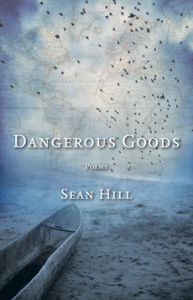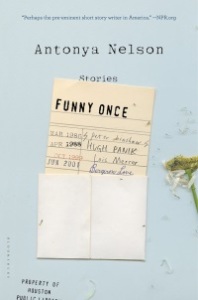From the desk of Giuseppe Taurino: Notable books published by the UH Creative Writing Program community in 2014
December 16, 2014, by Giuseppe Taurino
Houston’s literary community is brimming with activity. One of the key players making Houston such a vibrant literary city is the UH Creative Writing Program, nationally ranked as one of the best creative writing programs in the nation. Inprint is proud to continue providing fellowship, prizes, and other support for emerging writers in the Program, surpassing a total of $2.8 million to date. Giuseppe Taurino, Assistant Director of the Program, will now blog on An Open Book to share exciting news from UH. His inaugural post extols the virtues of 15 notable books written by faculty, alums, and students from the Program, many of whom have received Inprint fellowships and prizes.
I grew up in a working class immigrant family. My parents, along with most of my mother’s family, came to New York City from Italy in the early 1970s. None of them finished grade school. The moment I made it to October of my first semester at NYU, I’d gone further in school than anyone on either side of my family had ever gone. And when I actually earned my bachelor’s degree, I became proof that everything my parents endured over the course of their journey had been worth it. Even my father’s father, who was rarely impressed by anything, believed I’d taken the family to new heights. He was convinced my BA in Psychology made me a doctor—the first in the family—and went so far as to ask me to review and assess the medical reports detailing his heart and blood pressure conditions.
Rightfully or not, I’d earned a reputation for being an academic within my family, and book-smart amongst my friends. My being nervous about the ability to perform in a school setting was probably the last thing any of them would ever expect, but that’s precisely how I felt when I decided to leave Queens to pursue an MFA degree at UH. Coming from a background that didn’t value literature, having only taken a handful of lit courses as an undergrad and continuing ed student, and having exactly one completed short story to my name, I was convinced I’d be exposed at UH. From the day I was notified of my acceptance, to the day my then-girlfriend and I packed up my crappy car and started driving west, I kept thinking whoever decided to let me in had probably made a mistake.
It didn’t take long to realize, however, that I’d landed exactly where I needed to be. Yes, compared to many of the grad students I met, I was under-read and under-published. I lacked a basic vocabulary for how to talk about writing or what it meant to be a writer in the world. And Houston, with its oil money and megachurches and complete lack of pedestrians, was nothing like New York City. But even so, by the end of my first semester, I felt as if I’d found home.
It didn’t take long to realize, however, that I’d landed exactly where I needed to be. Yes, compared to many of the grad students I met, I was under-read and under-published. I lacked a basic vocabulary for how to talk about writing or what it meant to be a writer in the world. And Houston, with its oil money and megachurches and complete lack of pedestrians, was nothing like New York City. But even so, by the end of my first semester, I felt as if I’d found home. Between receptions, readings, workshops, and venturing out to explore what was—to me—a surprisingly dynamic city, I was engulfed by a sense of community. Instead of feeling exposed by my self-identified deficiencies, my teachers and peers made me feel as though my inexperience, and the earnestness and curiosity born from it, was a valuable contribution to the fabric of our community. And ultimately, being part of that community helped me realize that being a writer—perhaps more so than anything else—is not about arrival or knowing more than everyone else as much as it is about being a fully engaged participant. In the process. In the conversation. In the successes and frustrations of the community you’re a part of.
After completing my MFA degree, I traveled several paths that took me away from Houston and the UH writing community, only to find my way back to the city, and now, the Creative Writing Program itself, where I serve as Assistant Director. It’s a different role, and there are different faces walking through the halls, but it still feels like home. And though I don’t know every current student personally, much less most of the students and faculty that came and went before and after I completed my MFA, I feel a connection to all of them that stems from the knowledge we’ve navigated similar terrain—physically and emotionally. And I feel a sense of pride and vicarious accomplishment in their and my peers and our faculty’s successes, while continuing to pursue my own.
It’s with these thoughts in mind that I offer up a list of 15 notable books published by the UH CWP community in 2014, along with a little love heaped on each from someone outside the UH family—lest I come across as sentimental or biased.
Sean Bishop, The Night We’re Not Sleeping In
“Sean Bishop’s The Night We’re Not Sleeping In is a book equal to our dark and savage world. It rages, it defies, it rebels. It spits bile-brilliantly, refusing all the palliatives that religions, philosophies, and the various isms have proffered for centuries. Like Achilles, Bishop has a muscular capacity for anger. Like Milton’s Satan he will not be broken in spirit….The Night We’re Not Sleeping In is not a book that will comfort. Like all great art, it will disturb and provoke its readers. Bishop is intellectually and emotionally complex, a poet fully conscious of the shadow side—his and ours—which he articulates with fast-moving jabs of insight.”—Susan Mitchell
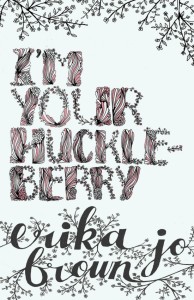 Erika Jo Brown, I’m Your Huckleberry
Erika Jo Brown, I’m Your Huckleberry
“In love poems that re-imagine a luxuriant tradition that goes back to The Song of Songs, Erika Jo Brown displays a captivating intelligence, a generous—and often fierce and ambivalent—sensibility, and a formidable verbal gift that calls to mind Berryman. Every line sparkles with life, wit, and humor. To the beloved (the reader) she offers what poets have always offered in their endeavor to express love: as much of the world as can fit into a poem—which is a lot!” —Geoffrey Nutter
Jericho Brown, The New Testament
“Jericho Brown’s The New Testament chronicles life and death, personal rituals and blasphemies, race and nation, the good and the bad, as well as illuminating scenarios of self-interrogation and near redemption. The lyrical clarity in this poignant collection approaches ascension. And here the sacred and profane embrace. Each poem celebrates free will. Naked feeling is never abstracted, and this poet knows how to see in the dark. The speaker says, ‘Every last word is contagious’; but also The New Testament is lit by signifying, an anthem of survival and jubilation.”—Yusef Komunyakaa
“Measuring the ‘distance between desires’ and the fear and possibilities of displacement, Sean Hill’s brilliant new book will make your heart skip ‘like those flat stones that kiss the skin / of the pond and fly off again.’ Where Hill’s first book was an evocation of his Georgia homeplace, Dangerous Goods travels widely and well, from nineteenth-century Liberia to present day Minnesota, from ‘Blacks on Boats’ to postcards written to nostalgia and regret. Channeling Richard Hugo and Jay Wright, Hill’s poignant, pointed poetry is a divining rod, knowing well that the dark is ‘an ocean for us all.’”—Kevin Young
Tony Hoagland, Twenty Poems That Could Save America and Other Essays
“Hoagland makes clear his affinity for subversion and irreverence in smart passages on idiom and diction that are packed with excerpts and explication of a wide range of poets, from Rainer Maria Rilke and Wallace Stevens to Lucie Brock-Broido and Marianne Moore. . . . A great read for poets and poetry lovers and a rejuvenating call to reimagine literary priorities.”—Booklist
Lacy Johnson, The Other Side: A Memoir
“Lacy M. Johnson’s powerfully moving and brilliantly structured memoir, The Other Side, asks, ‘How is it possible to reclaim the body after devastating violence?’ Her intense desire and demand for a life lived in the body is triumphant. Johnson’s strength to free not only her physical self, but also to move through years of incapacitating fear by writing this book, is breathtaking: ‘I lift the chain from my neck, over my head, let it rattle to the floor.’ “—Kelle Groom
Jason Koo, America’s Favorite Poem
“There is, it seems, an invisible question mark behind America’s Favorite Poem. What is it, who writes it? Jason Koo’s ruminations are capacious enough to consider a Jumbotroned Jay Z, the BQE and LeBron James’s elbow yet intimate enough to ask ‘whether I’ll ever feel like I have enough, whether I am enough.’ America’s Favorite Poem is full of irreverent swag and swagger, but it’s ultimately Koo’s exploration of what we consume and what consumes us that makes this book such a provocative and mesmerizing achievement.”—Terrance Hayes
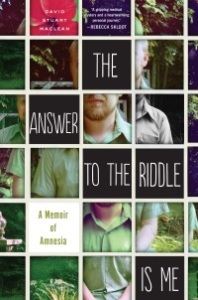 David MacLean, The Answer to the Riddle is Me
David MacLean, The Answer to the Riddle is Me
“MacLean has written a memoir that combines the evocative power of William Styron’s Darkness Visible, the lyric subtlety of Michael Ondaatje’s Running in the Family, and the narrative immediacy of a Hollywood action film. He reminds us how we are all always trying to find a version of ourselves that we can live with.”—The Los Angeles Times
David Thomas Martinez, Hustle
“Welcome to the world of David Tomas Martinez, where cars want to be stolen and the faucet is held like a gun, and homemade tattoos thicken with age. He breathes fresh air into American poetry by bringing it to the street—away from the Ivory Tower, away from the self-referential jokes and commentary. Martinez allows us to see Neruda’s love songs again, but this time they ‘whoop / a motherfucker’s ass.’ And he makes up his own vocabulary here, one in which the word ‘weekend’ comes from the word ‘weaken,’ long estranged from ‘wedded.’ Open this book on the poems like ‘Sabbath Fe Minus’ or ‘California Penal Code 266,’ or ‘Coveralls,’ and you will see right away a tone that is restless, metaphors that thrill you, and music that is so contagious it just won’t let you be. That is because David Tomas Martinez is a real poet.”—Ilya Kaminsky
“Nelson’s run as one of the finest contemporary short story writers takes an exhilarating leap forward with her outrageously superb seventh collection. Her particular wizardry in the short form (Nelson is also the author of four novels) is found in her exceptional melding of pristine prose with a rampaging imagination and a comic’s perfect timing. Nelson is scandalously funny, her characters are royally screwed up and wildly inept, and their dire predicaments bust down the doors on the most painful of life’s cruel jokes, from betrayal to divorce, addiction, and old age. Nelson excels at multigenerational chaos, portraying with equal verve surprising children and ornery adults as well as neurotic dogs and places rife with hidden angst, namely Wichita, Telluride, and Houston . . . Each of Nelson’s magnetizing stories generates atomic vibrancy and achieves the psychic mass of a novel.”—Booklist
Frances Justine Post, Beast
“Post is a poet who begins her first book with the line ‘I put on my face.’ I put on my face feels like the opening line of an honest monologue. A dark stage with one light from that light a voice. I put on my face is a pleading, an opening for a listener. Here in lies the complexity and sophistication of BEAST. I put on my face means Post has a past. We have much to gain from Post because she has much to give. BEAST is a book to fight off mediocrity and middle of the road culture. These are poems that stick to your bones.”—Tova Gannana
Kevin Prufer, Churches
“Churches is a collection that dazzles with sound and macabre landscapes where anything is possible…Prufer is a poet that you can trust with your mind. He may bring you to the reaches of subjective reality but you always return somehow more whole and with a greater understanding of the human conditions of suffering, grief, love, and fear.”—Jennifer Fitzgerald
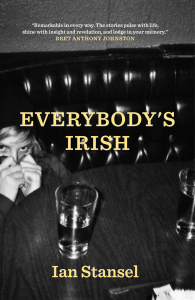 Ian Stansel, Everybody’s Irish
Ian Stansel, Everybody’s Irish
“These are stories of profound heart and deeply resonant humanity. I’m giddy to finally have all of Ian Stansel’s gorgeously crafted and emotionally affecting stories bound together in one volume that I can read and reread. Everybody’s Irish is my most-anticipated-book-of-the-year…and I’d wager that’s true for anyone who’s read even a single story by him.” —Thisbe Nissen
Peter Turchi, A Muse and a Maze
“While presenting different kinds of puzzles–from disappearing magic tricks to elaborate labyrinths–Turchi shows how writer and magician alike use self-presentation and withheld information to transport us to a ‘state of wonder’ and ‘invite us to think about something… worthy of extended consideration.’ [A Muse and a Maze] is consistently engaging, lively, and thought provoking. The interactive element is also a delight…Though Turchi’s volume seems most tailored to writers, readers and puzzle lovers should find much of value as well.”—Publishers Weekly
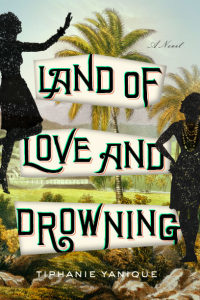 Tiphanie Yanique, Land of Love and Drowning
Tiphanie Yanique, Land of Love and Drowning
“Land Of Love And Drowning is a gorgeous incantation of a novel, a masterful fusion of place, language, and seductive storytelling that will hold you spellbound from its first pages to the last. Tiphanie Yanique takes on all of it—the bitter and the sweet, love and loss, betrayal and faith, as well as the distant machinations of state that push us about like so many minnows on ocean tides—and does so with a grace and wisdom that are nothing short of profound. This book is an absolute marvel.”—Ben Fountain


